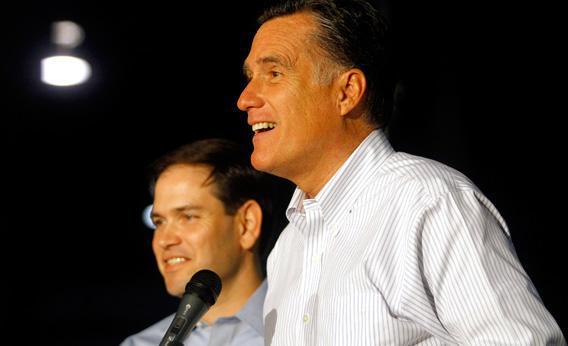Stephen Hayes in the Weekly Standard has written a typically thorough and smart analysis of Marco Rubio, who occupies the default spot at the top of most people’s list of vice presidential nominees. In that article, Rubio defends himself against an argument I made a few weeks ago about his lack of executive experience:
I chuckled when I read an article yesterday. The guy wrote that the only experience I have is being on the city commission. I mean, I’m not telling you that I’m the most experienced guy in the Capitol, but I served nine years in one of the largest legislatures in the country. I was in leadership eight of my nine years. I was majority whip, majority leader, and speaker of the house. We had a $72 billion budget—which is larger than most states. I wasn’t part of the landscaping crew until last week, either.
Great point, senator! Indeed, as the guy wrote in the article, you’ve got more experience than Abe Lincoln had when he became president. The question isn’t whether you’ve got experience—you’ve arguably faced more political challenges than Barack Obama had in political life when he ran for president in 2008. The question is whether you’ve got the kind of experience the man who might be your boss thinks is crucial for the job.
How important does Mitt Romney think it is to have executive and not legislative experience? While I was looking through old Romney ads, I came upon this one which is about the centrality of executive experience. Talking about why Hillary Clinton would make such a terrible president, he said: “She hasn’t run a corner store; she hasn’t run a state; she hasn’t run a city. She has never run anything.”
If you’ve never run anything, Gov. Romney thinks you are disqualified from office. Marco Rubio falls short of the Romney standard. Does that matter? As Hayes points out, Rubio is a talented politician. What independent voter is going to think even for a second about the academic question of whether politicians have a certain kind of experience? Voters make their choice based on their gut and Rubio has a lot that appeals to that gut. Plus, nominees have picked running mates that contradict things they’ve said before. Heck, Ronald Reagan picked his opponent, George Bush. President Obama picked Joe Biden, who once said Obama wasn’t qualified for the office. So no big deal.
But is there a different standard for Romney, since one of his weaknesses is that he’s regularly reversed positions that he previously suggested were iron-clad. Romney has been attacked for this, but he’s been talented enough at showing malleability and at shifting his emphasis on things to get himself the GOP nomination. Anyone who is so sensitive to these kinds of flip-flops that they would disqualify Romney has already done so. That means the political downside to choosing Rubio—and appearing to flip-flop once again—might be zero. Independent voters don’t like rigidity. So, if you really wanted to push it, you could argue that by picking Rubio (who does not come across as doctrinaire) Romney might send signals to independent voters that he’s not as “severely conservative” as he tried so hard to prove during the primaries.
It is a cliché of campaigns that a nominee’s vice presidential pick is the first presidential-level decision he makes. Usually that is supposed to mean it’s a furrowed-brow business, nonpolitical and all about the attributes required for office—like executive experience. But contradicting what you once prized with a straight face is also a necessary requirement of the presidency. So even if Romney picks Rubio, his staff can still claim he passed the first presidential test with flying colors.
